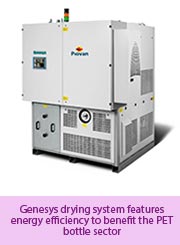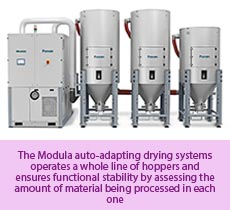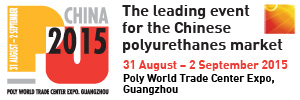Italian auxiliary equipment company Piovan says that it is confident it will expand further in 2015, having increased its international profile and sales volumes.
It also launched a new corporate identity in October 2014, revamping its website and media packages to show its growth, as well as the integration of all the new companies it has acquired. Universal Dynamics, FDM, Aquatech and Penta have all kept their original trading names but at the same time have been integrated into the group structure.
To recap, in 2014, Piovan’s sales went up, and it now has seven production facilities and 23 associated companies, making it a multinational-style of organisation that is based on strong local representation and a close working relationship with its customer base, it says.
The group started acquiring companies starting off in 2008 with its acquisition of Universal Dynamics (Una-Dyn), a US-based company specialising in the design and production of storage, handling, blending and drying systems. The Una-Dyn purchase was key to Piovan’s breaking into the US market.
In 2010, German company FDM, a supplier of blending systems for extrusion lines, joined the group. This was followed, at the end of 2014, by Penta, an Italian firm that designs and produces large-scale systems for the storage and handling of raw materials and ingredients in powdered form used mainly in the plastics and food and beverage industries.
Aquatech, a new company founded to operate in the industrial refrigeration sector, opened its doors in January 2015 and represents a natural evolution of Piovan’s existing chiller department. Another member of the group, Energys, works mainly on the Italian market in the field of energy efficient industrial systems.
Looking back, Piovan, which is headquartered in Santa Maria di Sala, Venice, was founded in 1934 as a mechanical engineering company. In 1964, it entered the plastics industry specialising in the manufacturing of auxiliary equipment. During the 50 years it has reached many important milestones and it has extended its areas of expertise to include a number of sectors in which plastic materials are used.
Ten years ago, the company was divided into four divisions: Injection and Blow Moulding, Extrusion, PET Preforms and Optical Applications. At the beginning of 2013 there was a further re-organisation with the introduction of ten application sectors that correspond with specific industrial segments and products that Piovan, together with other companies from the group, is able to supply: PET Preforms & Bottles, Rigid Packaging, Automotive Components, Medical Solutions, Technical Parts, Thermoforming & Technical Sheets, Flexible Film, Pipes/Profiles/Cables, Fibres & Strapping, Recycling & Compounds.
The company says that its 900-strong workforce includes R&D engineers, and technicians who provide after-sales assistance to customers.

In 2006, the company started the development of products that offer maximum energy efficiency with the launch of the first “high efficiency line” products in 2010. It says that the validity of this approach is confirmed by the number of orders received from the many brand leaders that have purchased solutions from Piovan in recent years.
The Genesys drying system, for the PET bottle sector, is an example kick-started by applications used in the packaging sector as this accounts for about half of all plastic materials in production around the world. Though Genesys may be more expensive than a more conventional system, according to Piovan, the system has had a successful take up rate due to the quality and production. Apart from the low energy consumption, the system is able to optimise the production process.
In the same field another interesting development is the high-profile contract Piovan signed with BMW in 2012 as an exclusive supplier of drying, blending and feeding systems for the automotive giant’s production facility in Leipzig, one of the most advanced in the world in the automobile industry. This contract was obtained in the face of stiff competition from five of the foremost auxiliary equipment manufacturers.

In particular, the Modula series of auto-adapting drying systems operates a whole line of hoppers and ensures functional stability by assessing the amount of material being processed in each one. In multi-hopper systems, the different types of plastics materials being processed and the varying conditions that arise during the production process are two of the most important factors that must be taken into consideration in achieving operational consistency and reduced energy consumption. This focus on operational consistency played an important role in determining BMW’s final choice. Piovan says that its closest competitors for this contract offered solutions that had twice the energy consumption levels of Modula.
(PRA)































